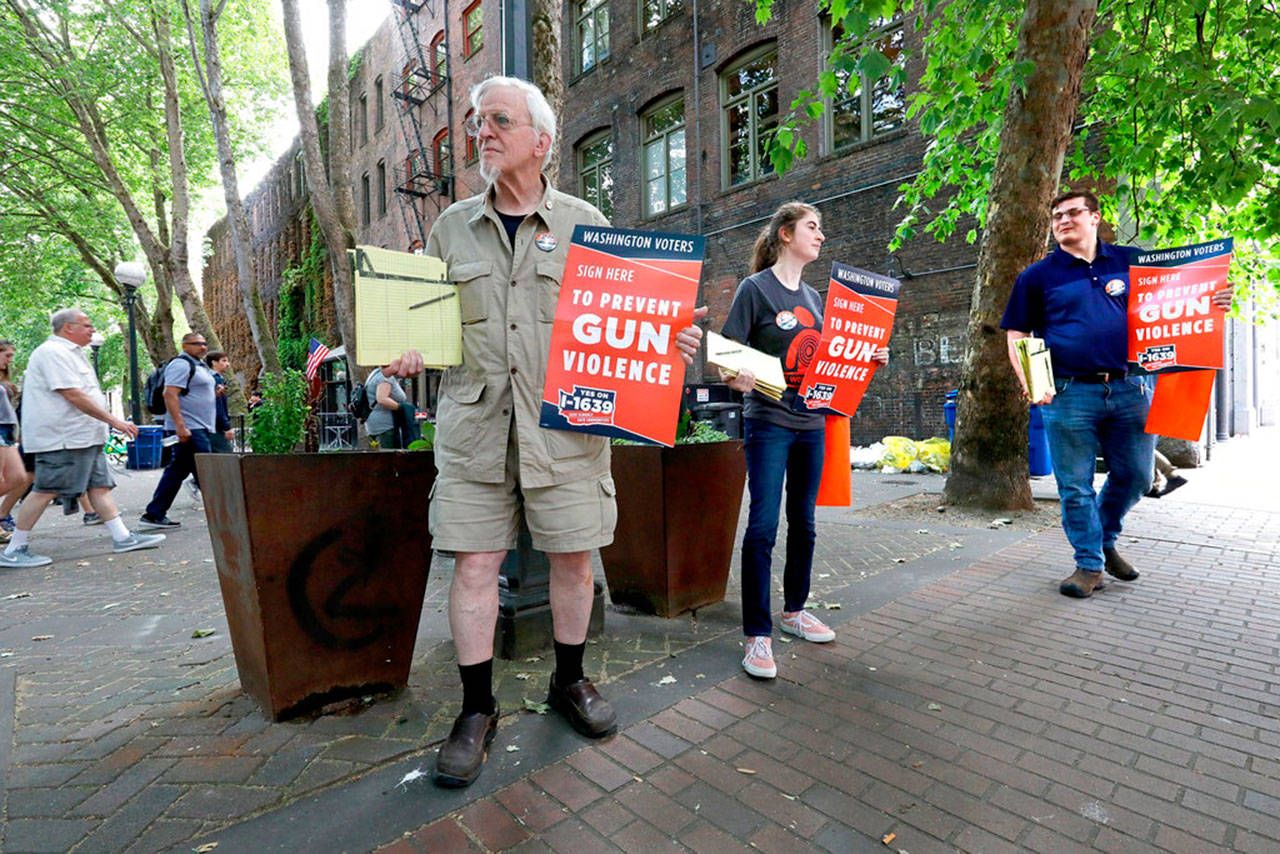By The Herald Editorial Board
The question over whether the fine print is too fine will have to wait until the voters have had their say.
The state Supreme Court on Friday afternoon overturned a Thurston County Superior Court judge’s decision that had ordered the secretary of state to keep Initiative 1639 off the ballot. The initiative, for which supporters had collected 100,000 more signatures than required to get it on the ballot, will now be included with other initiatives and races on the November general election ballot.
Among several provisions, I-1639 would raise the age for purchase of semi-automatic rifles to 21 from 18; expand background checks for the purchase of those weapons; require gun owners to complete firearm safety training; and establish standards for safely storing firearms.
Seeking to stop the initiative before voters had a chance to approve or reject it, opponents, including the National Rifle Association and the Bellevue-based Second Amendment Foundation, challenged the measure in court, claiming that the initiative language printed on the back of petition forms was too small and didn’t include customary strike-throughs and underlines that indicate where state law was being omitted and amended. State law requires initiative petitions include a “readable, full, true and correct” copy of the measure on its reverse.
And Thurston County Superior Curt Judge James Dixon agreed it wasn’t readable. “I have 20-20 vision. I can’t read it,” Dixon said in ruling that held the measure should be kept off the ballot.
But the state Supreme Court reversed Dixon’s decision, in an opinion written by Chief Justice Mary Fairhurst, determining that the state law regarding the petition’s readability wasn’t one of the state statutes that decide whether the measure should be placed on the ballot. State law that pertains to the authority of the secretary of state regarding initiatives specifies the number of signatures required, filing deadline and other language requirements, but not whether it meets the “readable, full, true and correct” requirement.
That argument will have to wait until after the election, assuming voters approve I-1639.
The Herald Editorial Board will wait on its own decision on whether to endorse the initiative or not until after it has met with proponents and opponents of the measure, but we agree voters should have the first crack at it.
The Supreme Court’s decisions should not have been of much surprise, as noted by The Herald’s political reporter Jerry Cornfield, just days before the ruling.
“You should know justices really don’t like to mess with initiatives before voters get a crack at them,” Cornfield wrote. “Their tendency is to not impede use of this tool of populist protest which got chiseled into the state constitution in 1911.”
That preference to wait for the voters’ ruling protects the people’s ability to directly adopt state law while still preserving the opportunity for constitutional review of those laws.
Some direction from the courts on the issue may be necessary for the good of the state’s initiative process. No where in state law regarding initiatives is there any specification for the size of the type or whether the strike-throughs and underlines are necessary to qualify as “readable, full, true and correct.” Other initiatives have qualified for the ballot and become law and used the same size type as I-1639 had.
But there’s another reason for allowing the initiative to proceed to the ballot. Even if an initiative that wins voter approval fails a constitutional challenge, the election results provide state lawmakers with a clear indication of the voters’ wishes regarding an issue.
A measure from nearly 20 years ago, brought forward by Mukilteo initiative promoter Tim Eyman, provides the example.
Eyman’s Initiative 695 — which called for voter approval of any tax increase, repealed existing fees and excise taxes for motor vehicles and imposed a license tab fee limit of $30 a year — was approved by 56 percent of the voters in 1999. But a few months later, the measure was found unconstitutional by the state Supreme Court on grounds that it violated state law that requires initiatives address only a single subject.
Largely on the voters’ support for I-695, however, lawmakers, at the urging of Democratic Gov. Gary Locke, passed legislation that put the $30 license tabs on the books.
If I-1639 were to be approved with a similar mandate — then found unconstitutional because of a deficiency with the petition — proponents will have a strong case to make before lawmakers that they should pass legislation that includes the ballot measure’s provisions.
For all of the flaws of initiatives, they remain the most direct method for establishing and determining support for the laws that voters want in place. The voice of the voters shouldn’t be preempted.
Talk to us
> Give us your news tips.
> Send us a letter to the editor.
> More Herald contact information.

























